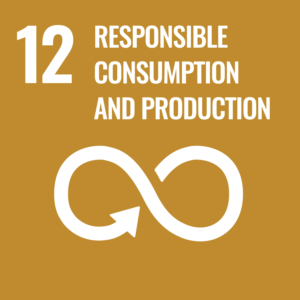SDG12: Responsible Consumption and Production
The University is committed to promoting and delivering more responsible consumption and production patterns through its operations and supply chains, through sustainable management practices and efficient use of natural resources.

Waste and Resource Management
Responsible waste disposal is a priority at the university, ensuring that we protect our land by ensuring we have enough external bins in the right places for food, mixed recycling, general waste, dog waste and coffee cups. Our Waste disposal policies are central to demonstrating the way in which we manage all types of waste produced by the university directly or indirectly. This includes the disposal of Hazardous and Offensive materials as well as how we minimise the use of plastic and single use items on site.
Working closely with our waste contractor the University tracks waste generated across its estate, covering all waste streams created, the locations, recycling rates and residual waste sent for energy recovery. Our goals are to increase waste segregation and improve our recycling rates from 70% to 80% by 2030, through the elimination of single use plastics and to minimise consumable items.
Various initiatives take place across the university driving awareness of correct waste disposal practices including the use of an Student Environmental Scorecard for students residing in halls to monitor and encourage student engagement with recycling. Future goals are to work closely with our supply chains to avoid waste being created in the first-instance.
As part of the university’s commitment to improving recycling rates and resource management, in 2019 the Up For The Cup, cup recycling project launched. This is a socially impactful project, funded by the Hubbub Cup Fund to support engagement, awareness raising, marketing, infrastructure and collection across partners covering major employers within the town centre and the major transport hub providing a through geographic coverage of Northampton. Since the launch in 2019 the university along with partners from Grosvenor Shopping Northampton, Northampton Train Station and Delapre Abbey captured and recycled approximately 98,953 cups.
The University’s 2nd Year Advertising & Digital Marketing BA (Hons) students played an integral role in the campaigns delivery. The students were tasked with the responsibility to devise a year-long marketing campaign to support the successful delivery of the campaign and raise awareness of the need to recycle paper cups across Northampton. In recognition of the role the students played in the success of the project was a Green Gown Finalist 2021 in the Student Engagement category.
Please check out our latest research for SDG12: Responsible Consumption and Production.
The University works closely with our catering suppliers to ensure that locally and ethically sourced meat, fruit and vegetables are used within all of our food outlets. This commitment is reflected in the purchase our fair-trade coffee, locally sourced food and seasonal menus, which contain both vegetarian and vegan options. The University’s commitment to ethical procurement is detailed within our Ethical and Sustainable Procurement Policy. Our caters also work closely with us in implanting our Single use Plastics and Disposable Items policy in reducing waste from disposable cups, replaced take away packing with compostable packaging and prior to lockdown provided eat in meals on crockery.
The university reports on several aspects of the SDGs through formal reporting processes and via the SDG webpages. Our Sustainable Development goals report and End of Year Environment & Sustainability reports provides an overview of our Environment and Sustainability and estate development activities for the academic year. Additional reporting of progress against sustainability targets and action plans for delivering against the coming 12 months targets are contained within our externally audited Investors In the Environment Manual.
The University is committed to promoting sustainable consumption and production through several modules contained within courses delivered.
The University is committed to pushing the SDG 2030 agenda across its networks and using its partnerships and resources to drive impact towards SDG goals. This is embodied at the top of the organisation, with the Vice Chancellor Nick Petford’s personal commitment to the SDGs. Examples of this commitment within SDG12 is leading discussions on global leadership and sustainability at the Inbush Conference with Amity University, India. Further collaboration for the SDG best practice, is demonstrated through the Research by the Institute for Creative Leather Technologies (ICLT) with the Confederation of National Associations of Tanners and Dressers of the European Community (COTANCE) and European Commission, utilised ICLT’s internationally renowned expertise and reputation to better understand the Health and Safety (H&S) and sustainability risks along the leather value chain and how they are managed in tanneries. This research was reported to the European Commission to inform policy development and dialogue in this area as part of their Social Dialogue programme. Further examples of cross sectoral dialogue about the SDGs with the Institute for Creative Leather Technologies and the ISII has presented research to the OECD on health and safety in tannery supply-chains as part of their Forum on Due Diligence in the Garment and Footwear sector.